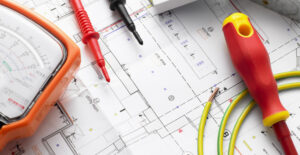If you’re in need of an electric repair, you may have heard about fuses or circuit breakers. Those things are essential to having a working home, and if they blow, you will need to find a professional. You can also get in touch with Sharp Electric to repair your lighting fixtures.

Overloaded circuits are a problem that is caused by too many appliances connected to the same socket. This is a major cause of house fires. It can also damage your property and cause injury. If you think that you might have an overloaded circuit, call an electrician.
A circuit breaker is used to cut off the flow of electrical current to overloading circuits. A faulty circuit can cause electrical shocks, electrical fires, and personal injury.
One of the best ways to prevent an overload is to learn which circuits power your appliances. Once you have a handle on this, you will be able to prevent an overload from destroying your home.
Another way to prevent an overload is to move your plug-in devices to another circuit. You may also need to adjust your usage. Using too much electricity is never a good idea.
The key to avoiding an overload is to keep an even load across the entire system. That means that you should not be putting too many heat-producing appliances on one outlet.
An overloaded electrical circuit can lead to melted wiring and insulation. Melted wires can also ignite a fire. In order to avoid this, you should not touch the wires on the panel.
To identify an overloaded circuit, you should first check to see if the breaker is tripping. If it does, you should unplug all appliances from the circuit.
Check the breaker’s status with a digital multimeter. There should be a definite “on” or “off” click.
Also, look for signs of wear on the circuit breaker panel. This can include cracks, burn marks, or a burning smell.
Lastly, be sure to unplug any lamps that are on the same circuit. You can also use a digital multimeter to determine how many amps are being drawn by all your appliances.
If you have a home warranty, you may be able to get help covering the cost of repair for an electrical system that has been damaged. Fortunately, you can also do some simple repairs yourself. However, you should always consult with a professional if the problem is complex.
For example, if you have a blown fuse, the first step is to determine what exactly caused the problem. A short circuit is often the culprit. This can occur when a hot wire touches the grounding path or the neutral wire.
Another common cause of a blown fuse is a faulty appliance. In this case, you should contact a qualified electrician. You will need to check the voltage of your appliances and unplug them from the circuit.
Also, you should make sure that you are using the correct-sized fuse. An incorrectly sized fuse could lead to a fire.
The best way to check for the best fuses is to look at the labeling. If the fuse is old, you might want to have it replaced. There are various types of fuses, and you can find screw-in fuses that typically have 15-amp ratings. Similarly, you can buy a 30-amp fuse that can be attached to the wall.
It is possible to replace a blown fuse on your own, but it might be better to have a qualified technician do it for you. Once you have the appropriate replacement, you can plug in your essential appliances. But remember to only do so if the circuit that was causing the trouble is not overloaded.
As a rule of thumb, it is important to remember that a blown fuse can have a detrimental effect on your home’s power system. To avoid this, limit your device usage.
One of the biggest risks to your home is an overloaded electrical receptacle. Not only can it cause serious property damage, but it can also be life-threatening. Fortunately, you can avoid overloading your receptacle and your wiring with a few simple steps.